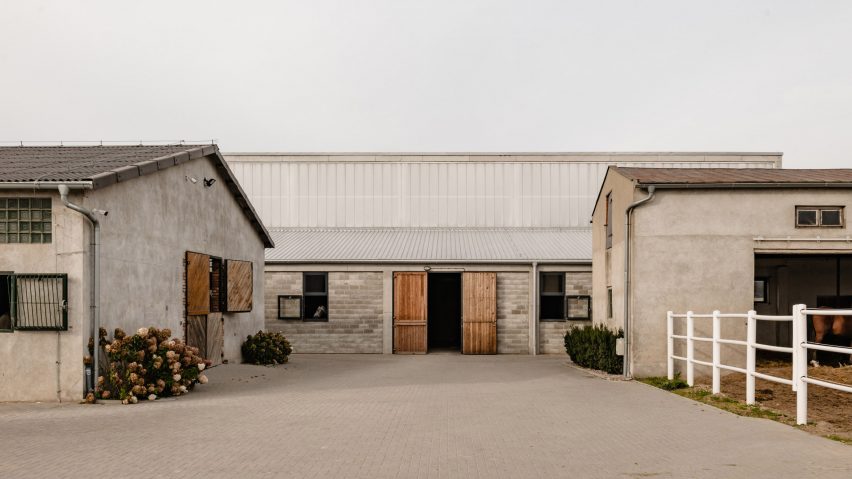A mono-pitch roof and raw material finishes characterise Horse House, an equestrian centre that architecture practice Wiercinski Studio has added to a stable in rural Poland.
Located at a local stable in the village of Jaroszewo, the concrete structure references surrounding industrial buildings and contains a breeding and training space for horses.
"The village is built up with houses and farm buildings with varied materials, shapes and scales of roofs," Wiercinski Studio founder Adam Wiercinski told Dezeen.
"There are picturesque fields all around, cut by the nearby expressway. The Horse House fits into a densely built-up plot with a house, existing stables and farm buildings," he continued.
Horse House has a reinforced concrete frame, which has been left exposed in places and infilled with concrete blocks. This draws on the exposed concrete used in the surrounding buildings.
"There are a lot of old, unplastered buildings in the area with visible concrete elements, which is due to economic conditions," said Wiercinski. "Horse House interprets this landscape in a contemporary way and the concrete blocks and their arrangement refer to the brick facades."
The studio topped the bulk of the building with a large mono-pitched roof, while a smaller adjoining structure containing eighteen stalls for horses has a roof sloping in the opposite direction.
These echo the rooflines of the two existing stable buildings between which Horse House sits. The roofs are supported on timber beams, which have been left exposed internally.
"The ridge of the building was moved to create mono-pitched roofs over internal spaces of different heights," the studio explained.
"The lowering of the roof over the stables matched the building in scale to the old stables and created a human-like walkway between."
Horse House's facilities include a full-size training hall fitted with obstacles, a warehouse, a storage space for training equipment, and a social area comprising a kitchen and study.
Located in the taller portion of the building, the training hall is lit by a polycarbonate skylight. A mezzanine level above the social areas offers a viewpoint over the training space.
"The polycarbonate is great at lighting the hall from the south, because it breaks up and lets soft light into the interior without creating sharp chiaroscuro on the ground, which can scare horses," said Wiercinski.
"It is a matte surface that is also safe for birds and in the evening the building shines gently like a lantern."
In the social spaces, the floor has been coated in grey terrazzo tiles that mimic the concrete walls, while a plywood ceiling adds a sense of warmth to the rooms.
Bespoke steel and timber furnishings created by local craftsmen feature throughout the social spaces, including lighting fixtures, tables, shelves and benches, alongside saddle-shaped hangers and racks for equestrian helmets.
Other stable facilities recently featured on Dezeen include a timber stable in Kyoto that celebrates traditional Japanese carpentry and a rectilinear equestrian centre in Mexico.
The photography is by ONI Studio.
Project credits:
Architect: Wiercinski Studio
Design team: Adam Wiercinski and Borys Wrzeszcz

